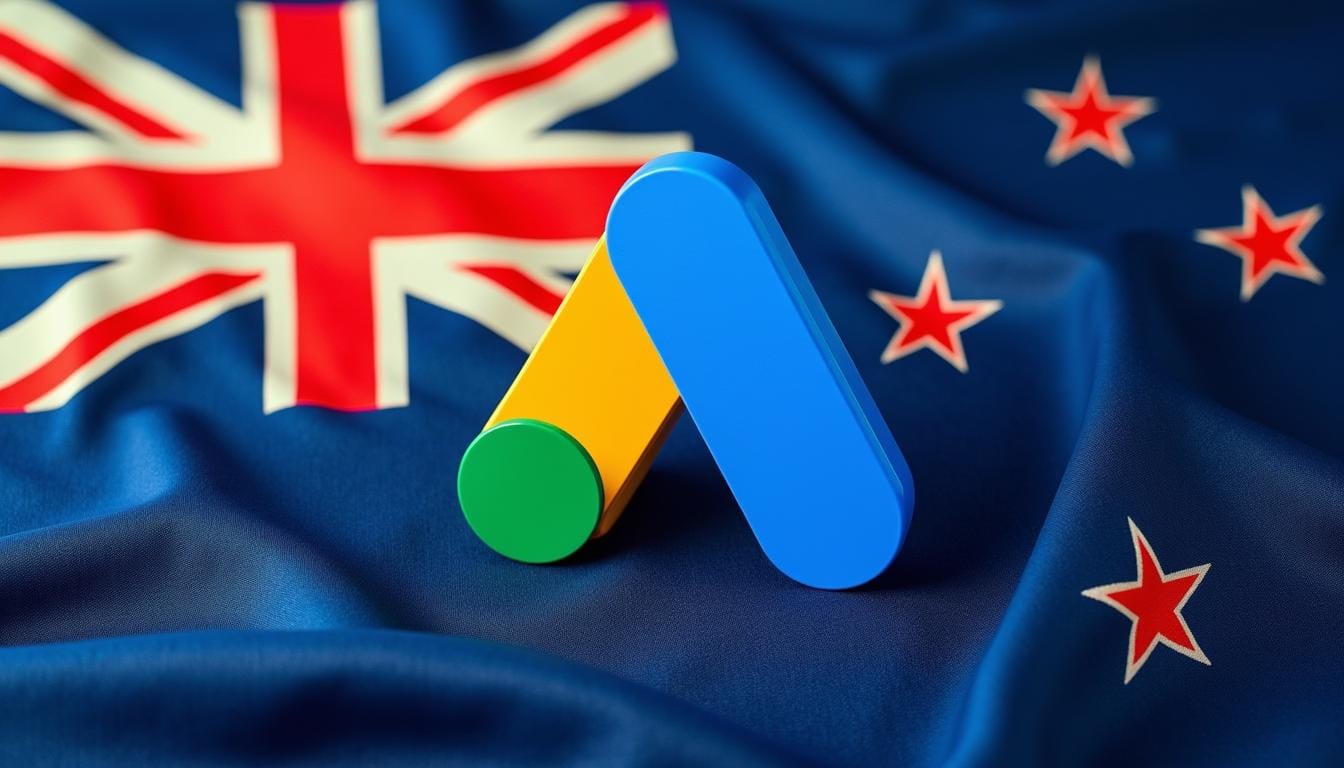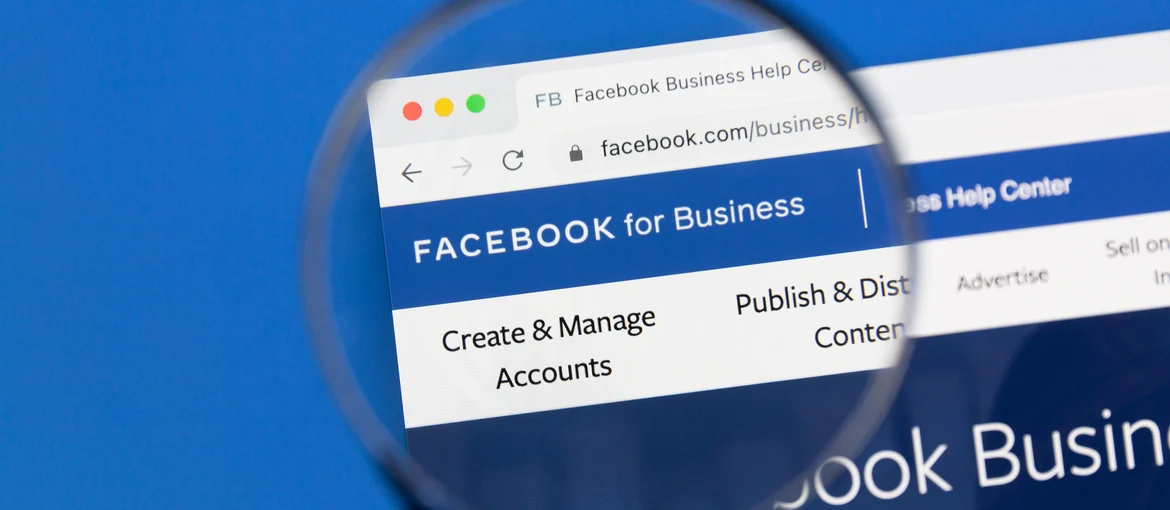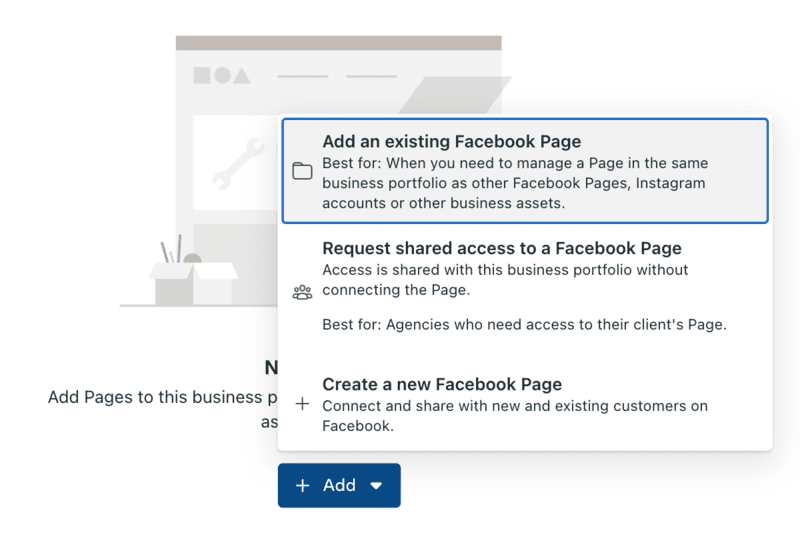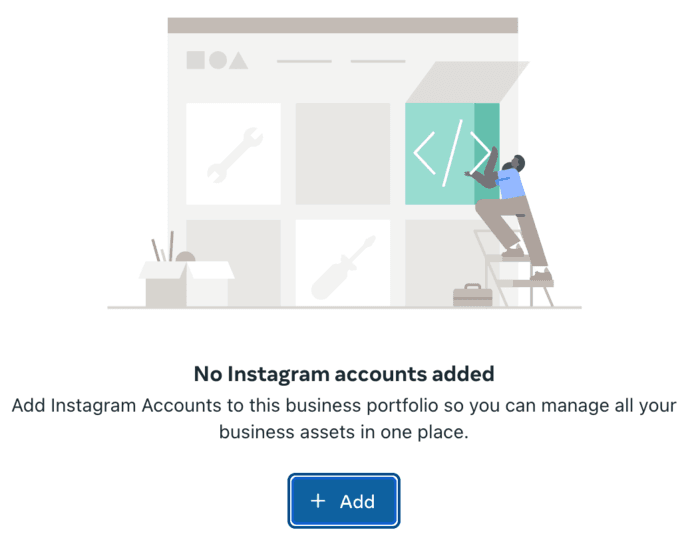How to Choose an SEO Agency
Define Your Goals and Budget
Before you even start searching for an SEO agency, clarify your goals. Are you looking for higher rankings for specific keywords, better local visibility, or an overall traffic increase? Knowing what success looks like to you will help you find an agency whose expertise aligns with your objectives. It’s also essential to decide on a preliminary budget range, so you can immediately filter out agencies that are either too expensive or suspiciously cheap.
Research the Agency’s Track Record
A reliable SEO agency should have a proven history of delivering results. Look for:
- Case Studies or Portfolios: Concrete examples of how they’ve helped clients improve rankings or conversions.
- Testimonials: Written or video endorsements from past or current clients.
- Reviews on Third-Party Platforms: Feedback on Google Reviews, Clutch, or other reputable review sites.
Even a smaller agency without big-name clients should be able to demonstrate how they’ve successfully helped businesses similar to yours.
Understand Their SEO Approach
Ask prospective agencies to explain their SEO strategy in plain English. Pay attention to:
- On-Page SEO: How they optimise site structure, meta tags, and content.
- Off-Page SEO: Their approach to link-building, social signals, and local citations.
- Technical SEO: How they handle page speed, mobile compatibility, and website indexing.
- Content Strategy: Whether they can produce or guide you to create high-quality, search-friendly content.
They should also be transparent about which metrics they monitor (organic traffic, keyword rankings, backlinks, conversions, etc.) and how often they report on them.
Check for “White-Hat” Practices
Some SEO tactics might promise quick wins but can eventually lead to Google penalties if they’re considered spammy or manipulative. Ask potential agencies about their stance on “white-hat” (ethical) SEO vs. “black-hat” (spammy) tactics.
- White-Hat includes high-quality content creation, natural link-building, and genuine on-site optimization.
- Black-Hat tactics may involve keyword stuffing, buying links, or cloaking.
You want an agency that stays on the right side of search engine guidelines for long-term, sustainable growth.
Look for Transparent Communication
SEO is a long-term investment, so you’ll want an agency that keeps you in the loop. During your initial discussions:
- Ask About Reporting Frequency: Will you get weekly, bi-weekly, or monthly reports?
- Clarify Communication Channels: Will they update you via email, phone calls, or video chats?
- Gauge Responsiveness: Notice how quickly and clearly they respond to your questions now—this often reflects future interactions.
If an agency is vague or reluctant to share details, that’s a red flag. Good SEO teams will openly explain their progress and provide actionable insights.
Assess Their Toolset and Technology
While tools don’t guarantee results, the right technology stack can improve accuracy and efficiency. Ask about:
- Keyword Research Tools: Such as Google Keyword Planner, Ahrefs, or SEMrush.
- Analytics and Tracking: How they use Google Analytics, Google Search Console, or other platforms to track performance.
- Technical SEO Tools: For site audits, page speed testing, and error reporting.
If they’re using legitimate, well-regarded tools, it’s a good indicator that they value data-driven decision-making.
Evaluate the Team’s Expertise
SEO is multifaceted, involving content creation, web development, PR, and more. While a smaller agency might not have a huge team, they should still have specialists who understand their respective fields. Ask:
- Who Will Handle Content Writing?
- Who Does Technical Audits?
- Who Oversees Link-Building or Outreach Campaigns?
A transparent agency will clearly outline who does what and why they’re qualified.
Discuss ROI and Timeframes
No ethical SEO agency can guarantee you’ll be “#1 on Google tomorrow,” but they should be able to give a rough timeframe for results based on your goals and industry competitiveness. Typically, meaningful results might take 3–6 months or longer. Ask them:
- What Kind of Results Can I Expect?
- How Long Before We See Notable Changes in Traffic or Rankings?
- How Do You Measure ROI? (e.g., cost per conversion, revenue increases)
Realistic expectations and open conversations about ROI will help you understand the level of commitment needed.
Trust Your Instincts
Finally, you’ll be working closely with your chosen agency, potentially for months or years. Pay attention to how well your personalities and work styles mesh. If you feel comfortable asking questions and the agency addresses your concerns without hesitation, that’s a good sign.
Is Google Ads Worth It for Kiwi SMEs? Here’s the Data-Backed Answer
For small to medium-sized businesses (SMEs) in Aotearoa, deciding where to invest your marketing dollars can be a real head-scratcher. You might be debating whether to pour resources into social media campaigns, email newsletters, or perhaps traditional avenues like radio and print. But what about Google Ads? Is it worth the spend, especially here in New Zealand? Below, we’ll dive into the most important facts, figures, and benefits—so you can make a clear, informed decision.
The Kiwi Online Marketplace Is Booming
If you’re questioning whether Google Ads even matters, consider how dominant Google is in New Zealand. StatCounter (2024) shows that Google holds around 93% of the search engine market share in NZ. On top of that, according to NZ Post’s eCommerce Spotlight, Kiwis spent over $6 billion online in 2024, and the figure that keeps climbing. With nearly everyone searching on Google and billions being spent online, having a presence at the top of the results page can give your business a real edge.
Immediate Visibility for the Right Audience
One of the biggest differences between Google Ads and organic SEO is speed. While SEO might take months to show significant results, Google Ads can put your business in front of potential customers almost instantly. The moment you launch a campaign, your ads can appear for relevant searches like “Auckland electrician” or “best café in Wellington.” This immediacy is especially valuable for local searches, as Google’s own research (Think with Google) indicates that 76% of people who search on their smartphones for a local business visit that business within 24 hours. By leveraging Google Ads’ location targeting, you can catch these high-intent shoppers exactly when they need you.
Flexible Budgeting and Cost Control
For many SMEs, tight budget control is a must. One of Google Ads’ greatest strengths is that you set your own daily or monthly limit and only pay when someone actually clicks on your ad (a pay-per-click model). If your costs start creeping higher than you’d like, you can easily reduce your bids or pause campaigns altogether—no lengthy contracts or hidden fees. This level of budgetary control makes Google Ads particularly appealing for smaller businesses that need to track every dollar.
Data-Driven Results You Can Measure
Unlike many traditional marketing methods, Google Ads puts robust analytics at your fingertips from the get-go. You’ll know exactly how many people see your ads (impressions), how many click on them (clicks), and how many actually convert into leads or sales (conversions). Armed with such transparency, you can refine your targeting, ad copy, and keyword strategy to make every dollar count. You’re not left guessing about your return on investment (ROI)—the data is right there, allowing you to quickly spot what’s working and what needs improvement.
Potential Pitfalls—and How to Avoid Them
Despite its advantages, Google Ads isn’t a silver bullet and can backfire if not properly managed. Some businesses make the mistake of using broad, generic keywords like “shoes” instead of more specific phrases such as “women’s running shoes NZ,” which can attract irrelevant clicks. Others fall into “set and forget” mode, never revisiting campaigns to optimise them, leading to ballooning costs without better results. It’s also essential to remember that more than half of New Zealand’s online traffic comes from smartphones. Ignoring mobile optimisation—both for your ads and your landing pages—can severely limit your success. Regular monitoring, ongoing adjustments, and a keen eye on mobile performance will help you dodge these issues.
Making the Call: Is It Worth It?
For most New Zealand SMEs, Google Ads can be a very worthwhile investment—particularly if your goals include immediate visibility, budget flexibility, and data-driven decision-making. If you want to capture shoppers who are ready to buy in a specific location, but don’t want to wait months for organic SEO to take effect, Google Ads offers a direct path to those potential customers. You can also measure your ROI every step of the way, which means less guesswork and more confidence in your marketing spend.
Final Thoughts
In a landscape where Google dominates local search and where eCommerce spending continues to grow, Google Ads occupies a unique position for Kiwi SMEs. With the right keywords, sensible daily budgets, and a commitment to refining your campaigns, Google Ads can deliver highly targeted, measurable results. While it’s no magic bullet, combining the near-instant impact of Google Ads with the long-term benefits of organic SEO often yields the best outcome: quick wins to generate leads now, and lasting growth for your online presence in the months and years to come. If you’re aiming to be seen by customers who are actively searching for what you offer, Google Ads stands out as a powerful, trackable, and potentially high-ROI channel for businesses across New Zealand.
Local SEO vs SEO: Which One Is Right for NZ Businesses?
If you run a small or medium-sized business in New Zealand—whether it’s a cosy café in Auckland or an online store that ships nationwide—you’ve probably heard of both local SEO and generic SEO (often just called “SEO”). But what’s the difference? And which approach makes the most sense for your business? Here’s a simple breakdown.
What Is Generic SEO?
Generic SEO (also called “national” or “global” SEO) focuses on ranking your website for broader, non-location-specific keywords. For instance, if you run an e-commerce store that ships nationwide, you might target keywords like “organic skincare” or “sustainable clothing” without specifying a location.
Key Features of Generic SEO
- Broad Audience
You’re reaching out to a wider market, often beyond city or regional boundaries. - Competitive Keywords
Because you’re targeting more general keywords, you’ll often face stiffer competition—from both local and global businesses. - Content and Link Building
A major part of generic SEO involves publishing valuable content that can attract a national or international audience, as well as building high-quality backlinks from reputable websites. - Longer Time Frame
Gaining visibility for highly competitive keywords typically takes longer, so you’ll need patience and consistency.
What Is Local SEO?
Local SEO is specifically designed to help your business show up in location-based searches. This is especially important if you serve customers in a specific area—like Auckland, Wellington, or any other region in New Zealand. For example, if you own a café on Queen Street, you want people searching for “best café in Auckland” or “coffee near me” to find you first.
Key Features of Local SEO
- Location-Focused
Your keywords and strategies revolve around geographic terms, such as “Auckland plumber” or “hair salon in Christchurch.” - Google Business Profile
A well-optimised Google Business Profile (previously known as Google My Business) is crucial for appearing in local search results and Google Maps. - NAP Consistency
NAP consistency refers your Name, Address, and Phone number are accurate across all online platforms (website, social media, directories) builds trust and helps search engines confirm your location. - Reviews and Local Citations
Positive reviews on Google and other review platforms can boost your local search rankings. Listing your business in local directories—like NZ-specific or Auckland-focused sites—further cements your local presence.
Who Benefits from Local SEO?
If you have a physical storefront, rely on foot traffic, or serve a specific region, local SEO is likely the right choice for you. Real estate agents, cafés, restaurants, plumbers, and electricians in Auckland or elsewhere in New Zealand can all gain a significant edge by targeting local searches. Even if you’re offering online services but want a strong regional client base, local SEO tactics can help you stand out to nearby customers.
Who Benefits from Generic SEO?
If you’re selling products or services online with no strict geographical boundary—for example, an online clothing boutique or digital marketing agency—you might benefit more from generic SEO. You’ll aim to capture national or even international audiences looking for a specific product or service, regardless of location.
Choosing the Right Strategy (Or Both)
For many NZ SMEs, a blend of local and generic SEO strategies often works best. You might start with local SEO if you’re focused on building a strong reputation in your immediate area. Once you’ve established a reliable local customer base, you can broaden your strategy to include more generic keywords and attract a wider audience.
- Local SEO First
- Focus on your Google Business Profile
- Target location-specific keywords
- Encourage reviews from happy local customers
- Expand to Generic SEO
- Broaden your keyword set (e.g., “best coffee beans” as well as “Auckland café”)
- Publish in-depth blog posts or videos that attract a national or international audience
- Build high-quality backlinks from authoritative sites
The Bottom Line
For Auckland and NZ-based SMEs, understanding the difference between local and generic SEO is crucial for developing an effective digital marketing plan. If you rely on local foot traffic or serve a specific region, local SEO should be your top priority. If you have the capacity and vision to reach customers beyond your immediate area, combine local SEO with generic SEO to capture an even broader market.
In the end, the best SEO strategy is the one that aligns with your business goals—whether that’s filling your café with loyal neighbourhood customers or selling your products throughout New Zealand (and beyond). By choosing the right approach or blending both, you can ensure that potential customers find you exactly when they need you.
Are SEO Services Really Worth It for SME in NZ?
If you’re a small to medium business owner in New Zealand, you may have heard about SEO (Search Engine Optimisation). But you might wonder, “Are SEO services really worth it?” This article will break down what SEO services involve, why they matter, and how they can benefit local businesses right here in NZ.
What Exactly Is SEO?
SEO (Search Engine Optimisation) is the process of making your website more visible on search engines like Google. When someone searches for a product or service (e.g., “best coffee in Auckland”), Google displays the most relevant results on the first page. Good SEO practices help your website appear nearer the top, so people are more likely to click on your site rather than a competitor’s.
Why SEO Matters for NZ Small to Medium Businesses
- Local Competition
New Zealand may be smaller than many global markets, but that doesn’t mean you face any less competition—especially online. From local cafés to tradies in your area, everyone is vying for attention on Google. SEO helps you stand out in your community, connecting you with customers who are actively looking for your services. - Long-Term Visibility
Paid ads can be great for quick results. But once you stop paying for them, the traffic often disappears. SEO, on the other hand, lays a foundation for consistent, long-term visibility. By investing in quality content and a well-structured website, you’re building an online presence that can keep working for you—even when you’re not actively running ads. - Cost-Effectiveness
While SEO isn’t free (you may need to pay for professional help or tools), it can be more cost-effective over the long haul. Each visitor that comes through a search engine costs you little to nothing on a per-click basis. Plus, the audience arriving at your site via SEO is often more targeted—they’re searching for exactly what you offer.
What Do SEO Services Involve?
When you hire an SEO professional or agency, they typically handle tasks such as:
- Keyword Research
Identifying the terms people use in Google (e.g., “electrician in Wellington”) and tailoring your content to match these searches. - On-Page Optimisation
Ensuring your website is easy to navigate, loads quickly, and has relevant content—plus well-crafted meta titles and descriptions. - Content Creation
Writing blog posts, articles, or product descriptions that answer your customers’ questions and position you as an authority in your industry. - Backlink Building
Gaining links from reputable websites. These links act like votes of confidence, telling Google your site is trustworthy and worth ranking. - Technical Maintenance
Fixing broken links, improving site speed, and making sure your site works well on mobile devices.
Can You DIY SEO?
Many Kiwi business owners wonder if they can handle SEO themselves. While you certainly can learn basic SEO practices (like adding keywords to your pages and listing your business on Google Maps), effective SEO often requires deeper knowledge and consistent effort. Factors like algorithm updates, competition analysis, and technical troubleshooting can become time-consuming. If you’re juggling many responsibilities, hiring an expert can save you a lot of hassle and help you see better results faster.
How to Measure the Value of SEO
- Increased Website Traffic
One of the clearest signs of successful SEO is a rise in organic (non-paid) visits. Monitor your traffic over time to see if it’s growing steadily. - Higher Search Rankings
Moving up from page two to page one on Google can make a huge difference in how many people discover your business. Track your main keywords to see your position rise. - More Leads and Sales
Ultimately, the best measure of SEO’s value is whether it contributes to more customers. Look at how many of your website visitors are filling out forms, calling your business, or making purchases. - Enhanced Brand Awareness
A top position on Google means more people see your name and learn about what you do. Even if they don’t immediately buy, they might remember you when they’re ready to make a decision.
Common Concerns About SEO
- “It Takes Too Long”
SEO isn’t a quick fix; it’s more like planting seeds. You might see small improvements within a few months, but full results can take six months to a year or more. The flip side is that it sets you up for sustainable, long-term growth. - “It’s Too Expensive”
While there can be upfront costs, remember you’re investing in an asset—your website—that can continue to generate leads for years. Compared to one-off ad campaigns, a well-executed SEO strategy often provides better value over time. - “SEO Is Too Technical”
Some parts of SEO are technical, but an experienced professional can handle all that. Basic steps (like optimising your Google My Business listing or writing blog posts) are within reach for most business owners.
Conclusion: Yes, SEO Services Are Worth It
For NZ small to medium businesses, SEO offers a real chance to compete online without breaking the bank. While it requires patience and a bit of investment, the payoff is substantial: more visibility, more credibility, and ultimately, more customers walking through your door—or landing on your website.
If you’re serious about growing your business and staying competitive, consider making SEO a key part of your digital marketing strategy. Whether you do it yourself or hire a professional, SEO can be a game-changer for reaching your goals in New Zealand’s ever-changing online landscape.
What Is SEO? A Simple Easy-To-Understand Guide.
Search Engine Optimisation (SEO) often feels like a mysterious puzzle. One of the most common questions we hear is, "What exactly is SEO?" To help you understand it better, we’ve put together a simple and fun guide that breaks it down in an easy-to-digest way.
SEO: The Ultimate Car Race to the Top
In the digital marketing world, SEO is often compared to a car race. Just like a race, success in SEO requires the right vehicle, a skilled driver, and a steady supply of fuel to keep going. If your goal is to cross the finish line (dominate search engine rankings), you’ll need all these elements working together seamlessly.
The Car: On-Page SEO
Your website is the car you drive in this race. On-page SEO—the structure and optimisation of your website—determines how well your car performs on the track. A well-built car that runs smoothly and efficiently is like a well-optimised website—it’s easy for search engines and users to navigate, giving you the best chance to win the race.
Imagine driving a car with flat tires or a broken engine; you’re not going to win any races. Similarly, if your website has broken links, missing metadata, or slow load times, it’s unlikely to rank well. On-page SEO includes:
- Title Tags and Meta Descriptions: These are the signs on your car that tell spectators (and search engines) what your site is all about.
- Site Speed: A fast car wins races, and a fast website keeps users engaged.
- Mobile Friendliness: In today’s race, having a car that’s versatile on all terrains (mobile and desktop) is critical.
Your car’s condition—your on-page SEO—lays the foundation for your success in the race.
The Driver: Content
Even the best car won’t win a race without a skilled driver. In SEO, your content is the driver steering your website to victory. Great content doesn’t just get you moving; it ensures you’re heading in the right direction and connecting with your audience.
Content is what search engines and users rely on to understand your site’s value. It drives traffic, builds relationships, and ultimately converts visitors into customers. Key aspects of content in the SEO race include:
- Keyword Optimisation: Knowing the road map (keywords) ensures your driver knows where to steer.
- User Intent: Content that satisfies what users are searching for keeps them engaged and ensures a smooth ride.
- Quality and Relevance: A skilled driver stays focused and makes strategic moves; your content should do the same by delivering value.
Your content’s ability to navigate the twists and turns of search engine algorithms directly affects your position in the rankings.
The Fuel: Off-Page SEO
No car can run without fuel. In the SEO race, off-page SEO—primarily backlinks—is the fuel that powers your vehicle. Backlinks are endorsements from other websites, signaling to search engines that your site is trustworthy and authoritative.
High-quality fuel (relevant and authoritative backlinks) will keep your car running efficiently, while low-quality or toxic fuel (spammy links) can damage your engine and set you back. Off-page SEO involves:
- Earning Backlinks: Building relationships with reputable websites that link to your content.
- Social Signals: Engaging with your audience on social media to drive traffic and credibility.
- Brand Mentions: Creating a buzz around your brand to build awareness and authority.
The more high-octane fuel you have, the further and faster you can go in this competitive race.
The Finish Line: Winning the SEO Race
Winning the SEO race isn’t just about having the best car, driver, or fuel—it’s about how well they all work together. A perfectly optimised website (car) with engaging content (driver) and strong backlinks (fuel) is unstoppable.
However, remember that this race isn’t a one-time event. SEO is a long game, much like an endurance race. Search engine algorithms constantly evolve, and competitors are always improving. To stay ahead, you need to:
- Regularly tune your car (audit and optimise your website).
- Train your driver (update and refine your content).
- Refill your fuel tank (continue earning quality backlinks).
Join the Race with Transform Digital
We understand that SEO is more than just a checklist—it’s a race to the top. As an Auckland SEO company, we specialise in ensuring that your car (on-page SEO), driver (content), and fuel (off-page SEO) are primed for success. Let’s help you cross the finish line and dominate the competition.
Ready to accelerate your SEO performance? Contact us today to get started!
Step-by-Step Guide: How to Set Up a Facebook Ads Account
Step-1: Set up a Meta Business Portfolio
Before creating a Meta ad account, you must set up a Meta Business Manager (or Meta Business Suite). This overarching name houses all your business assets on Meta platforms.
Here's how to get started:
1. Go to Meta Business Manager by following this link: business.facebook.com. Then, click on the Create a Business Portfolio button.
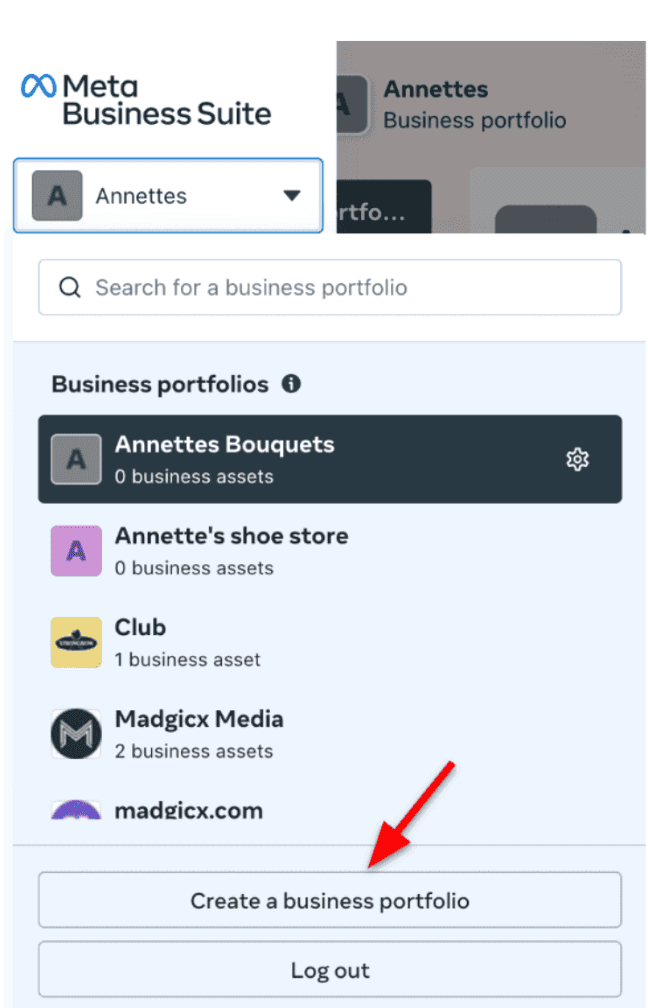
2. Enter your business name, your name, and the email address you want to use for your Business Manager account. It's important you write the correct account name as this is how you will show up across Facebook. Then click Create.
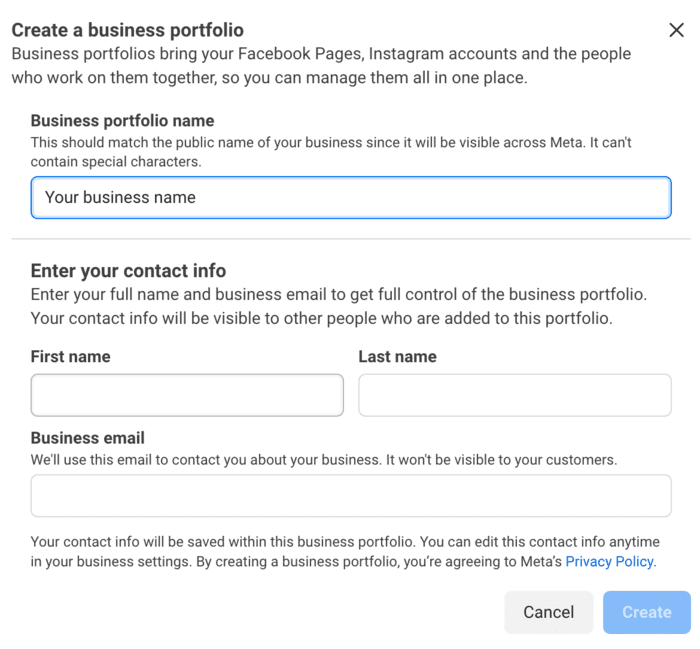
3. Verify your email address. You should receive a message from "notification@facebookmail.com" that asks you to confirm your business email address, and click Confirm Now.
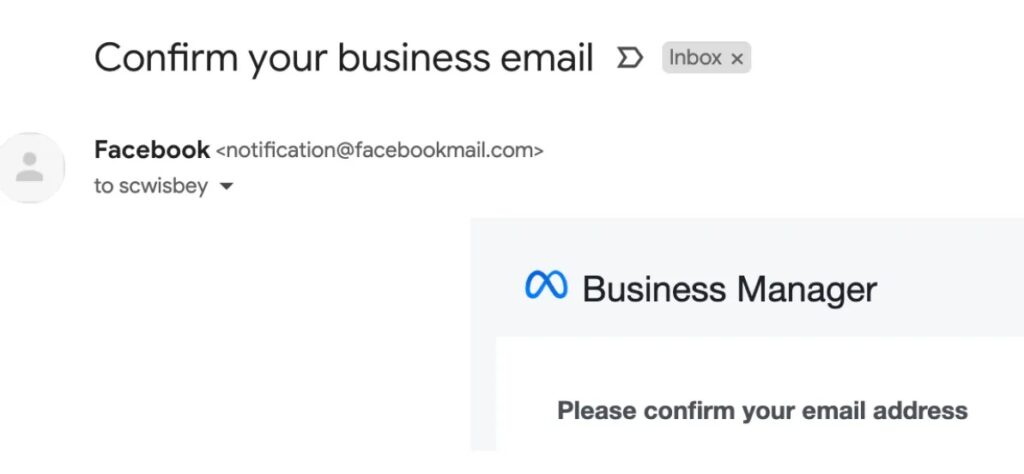
4. You will now be redirected to your Meta Business Suite dashboard. Click Settings to complete your Business Suite.
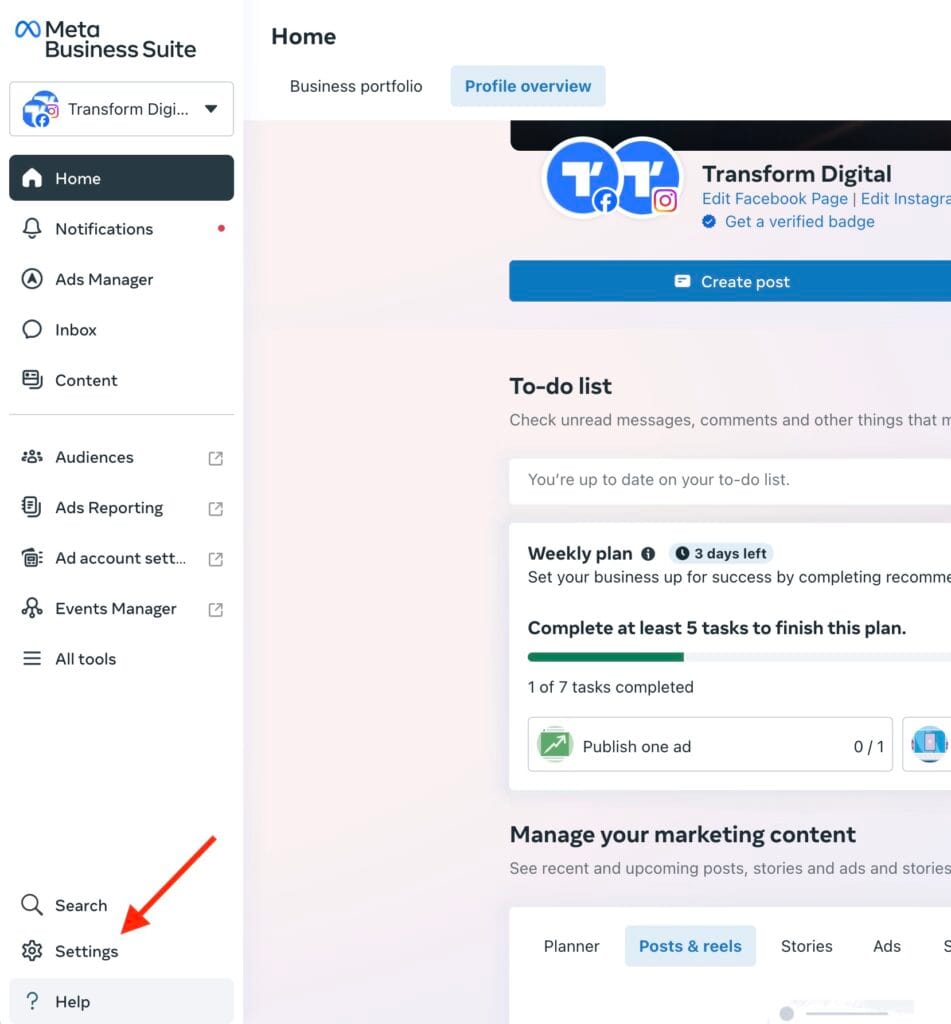
3. Click on the Business info at the top.

This page requires you to add your business details. Scroll further down to confirm your email address as well.

4. Navigate to the Security Center on the left side panel to ensure your business is verified.
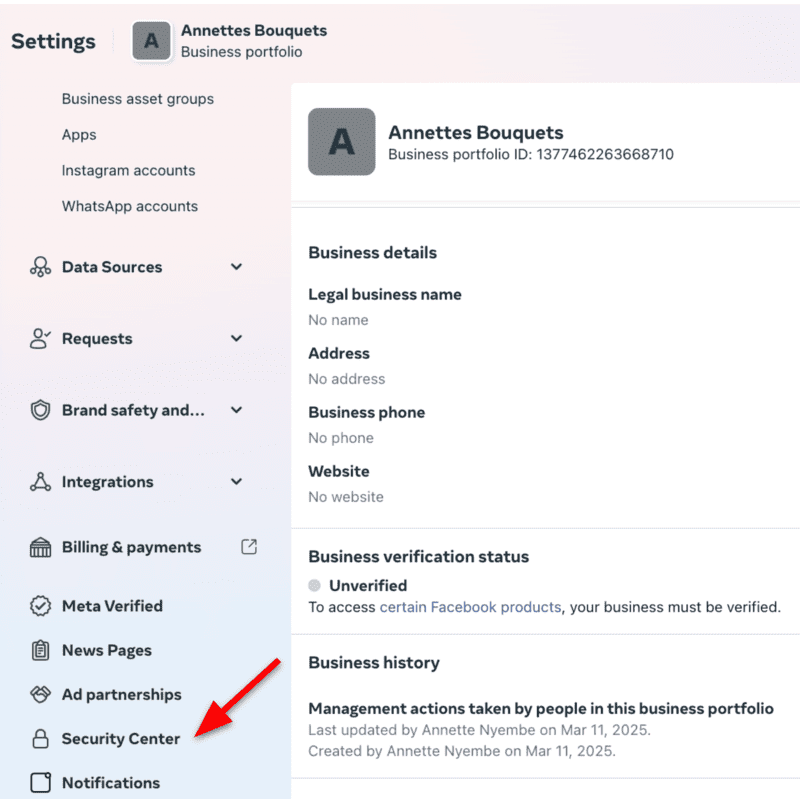
5. Look for the Start Verification button. Verified accounts are less likely to face random campaign blocks or account bans, making it a strategic move for businesses. For security purposes, Meta requires Business Portfolios to use two-factor authentication. Follow the prompts to set this up. On the right-hand side, you can add another admin to help if you get locked out of your account.
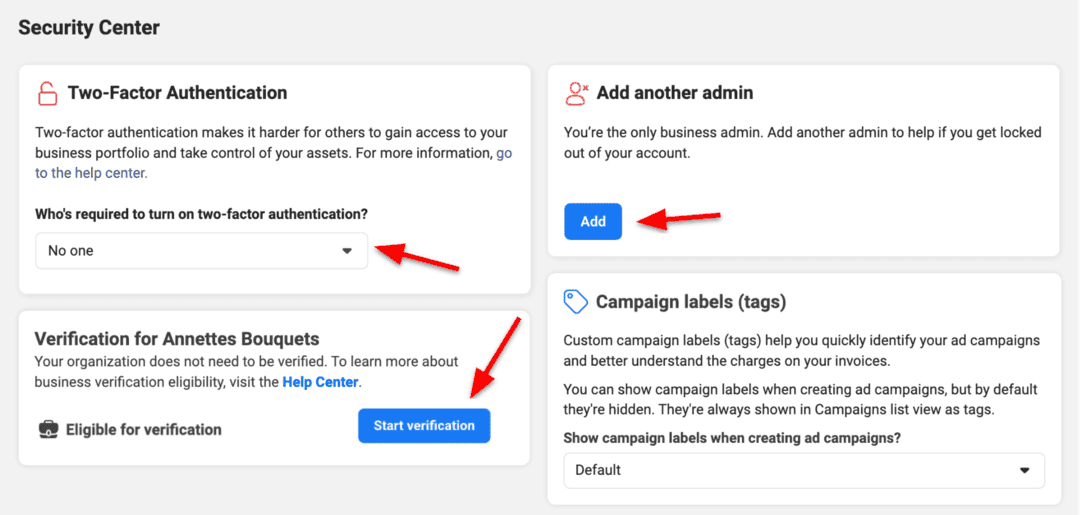
Step-2: Connect your Facebook Page to the Business Portfolio
Once your Meta Business Portfolio is set up, the next step is to ensure your key assets, like your Facebook Page, are linked to it. This connection is essential for running ads and managing your campaigns effectively:
1. It’s time to add your Facebook Page. On the left-side panel, navigate to Pages.
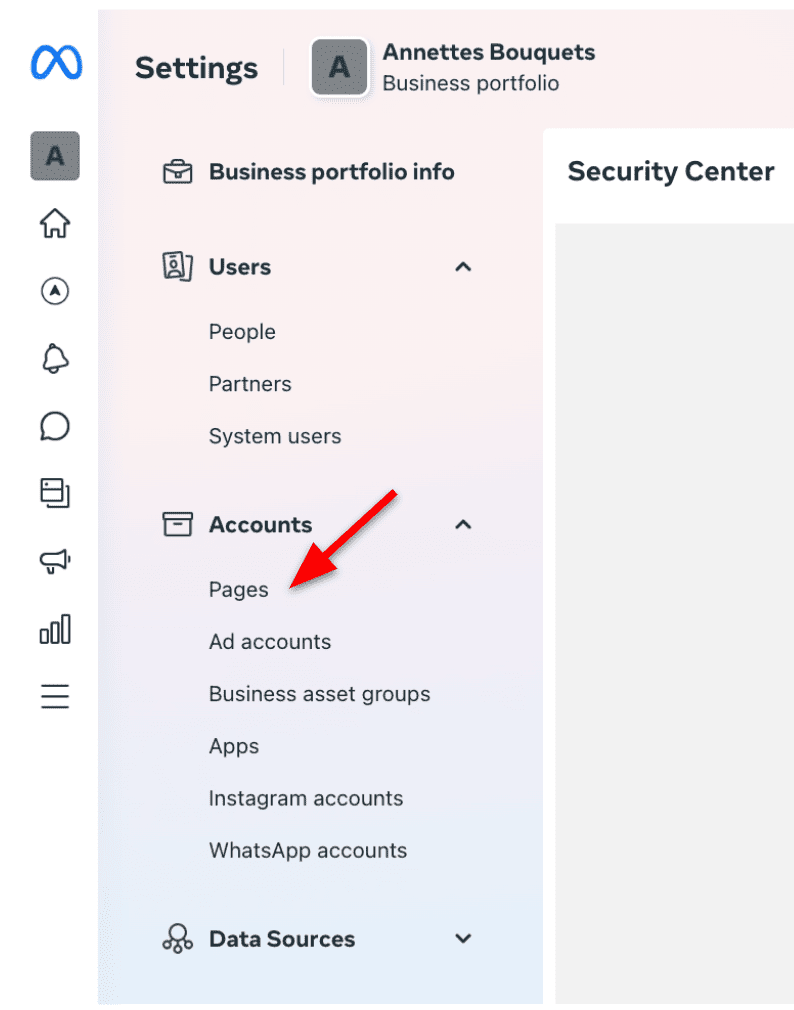
2. Tap the +Add dropdown menu and then select Add an existing Facebook Page to link your Facebook Page. Select the third option if you need to create a new Facebook Business Page. Click 'Next' afterward and follow the steps from there.
Connect your Instagram account to the Business Portfolio (Optional)
1. Scroll down to Instagram accounts in the same left-side panel menu.
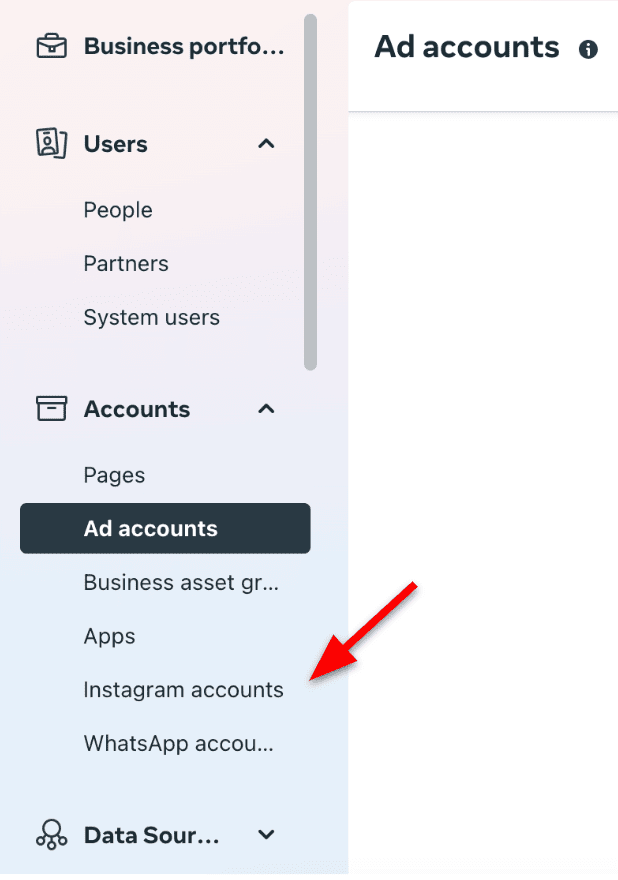
2. Click +Add and enter your Instagram login credentials. After logging in, the Instagram account will move to your Business Portfolio.
Step-3: Create a Meta ad account
Now that you’ve connected your Facebook Page and Instagram account to your Business Portfolio, it's time to create your Meta ad account. Here's a step-by-step guide:
1. In the Business Portfolio, go to Ad accounts under the Accounts section. Tap +Add to add a new ad account.

2. Select the Create a new ad account option.

3. Assign a name to your ad account, select the appropriate time zone, and choose your preferred currency. Be sure to select the correct time zone and currency. These settings cannot be changed later without closing the account and starting a new one. Tap ‘Next’ when done.

4. Indicate who you are using this ad account for, be it your business, another business, or a client. Then, click Next.
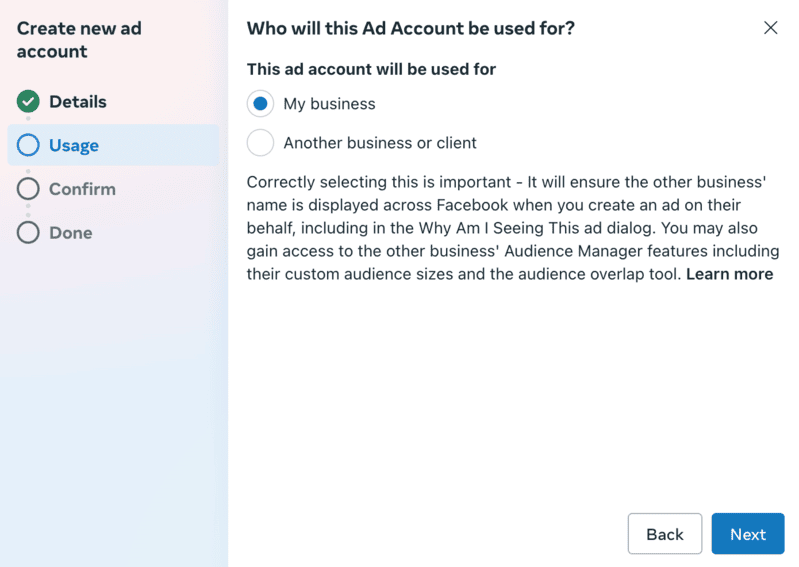
5. Accept the terms and conditions, then click Create ad account.
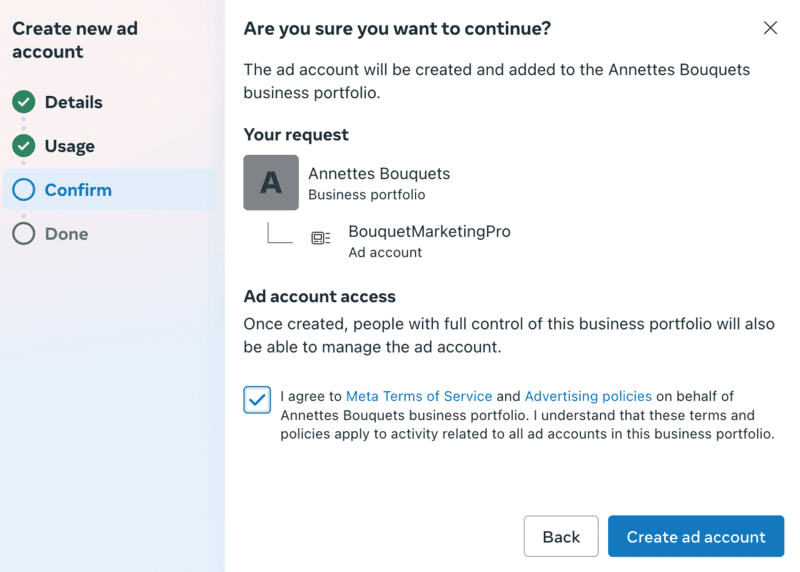
6. You'll need to set up payment information before you can run ads. Go to Billing & payments on the left-hand side panel.
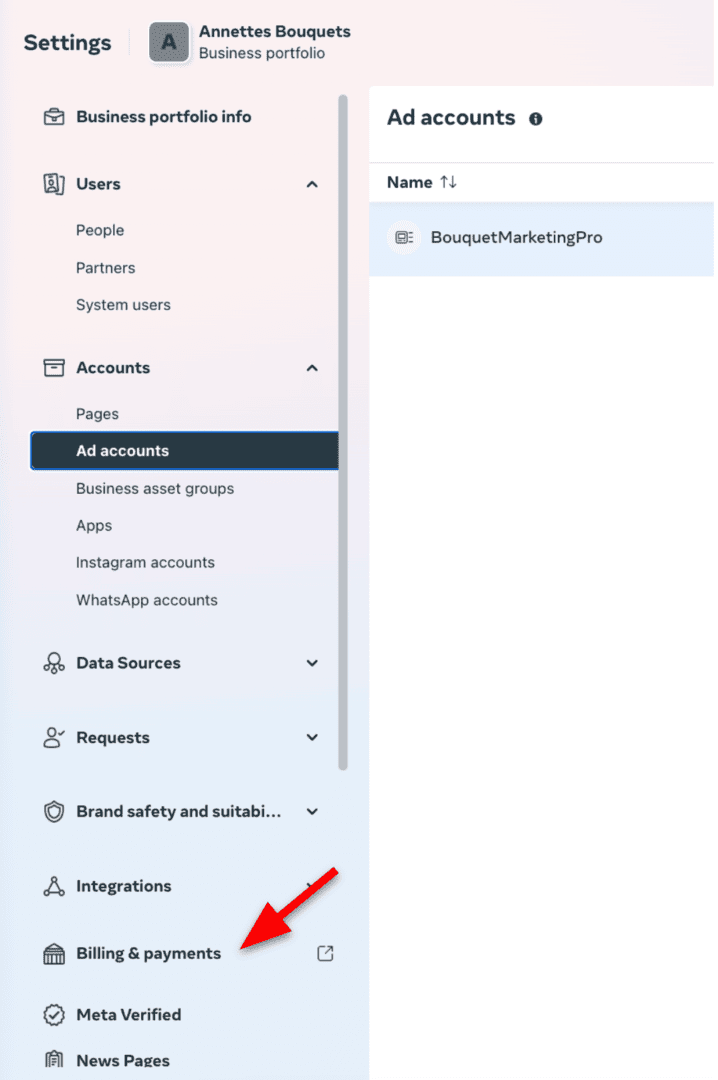
7. Click Add payment method and follow the steps to add your credit card and other payment details.
Step-4: Set up Meta Pixel and Conversions API
The Meta Pixel and Conversions API are essential for tracking actions people take on your website after seeing your ads:
1. In Business Portfolio Settings, go to Data Sources > Datasets in the left-hand menu.

2. Once you’ve clicked either tab, tap +Add button to create a new Pixel.

3. Name your Pixel (typically your business name). Click Create to proceed.

4. You should now be looking at the new Pixel in your Business Portfolio.

Step-5: Granting access to us
If we’re managing your Facebook Ads campaigns, you’ll need to grant us access to your Meta assets.
1. Click to the Partners section in Business Portfolio Settings.

2. Click the blue Add button next to the search bar.

3. Click Give a partner access to your assets.

4. Click the Partner business ID field and enter a partner’s business ID, you should received an email which contains Transform Digital Business ID.

5. That will send me an invitation in next 2-4 hours, once I accept it, you should receive an email notifies you that I've accepted, and you can see my name in Partner section in Settings.
6. Now you need to assign Ad accounts and Datasets to us, so click Assign assets.
 7. Go to Ad accounts and Pixels, toggle all to Full Control so that we can access it. Click Assign assets.
7. Go to Ad accounts and Pixels, toggle all to Full Control so that we can access it. Click Assign assets.

8. And that’s it! You have set up your Facebook Business Manager, Facebook Ad account and added us as your digital marketing partner. If you're still having trouble, no worries! We’re here to help. Just reach out to us to schedule a quick consultation.

